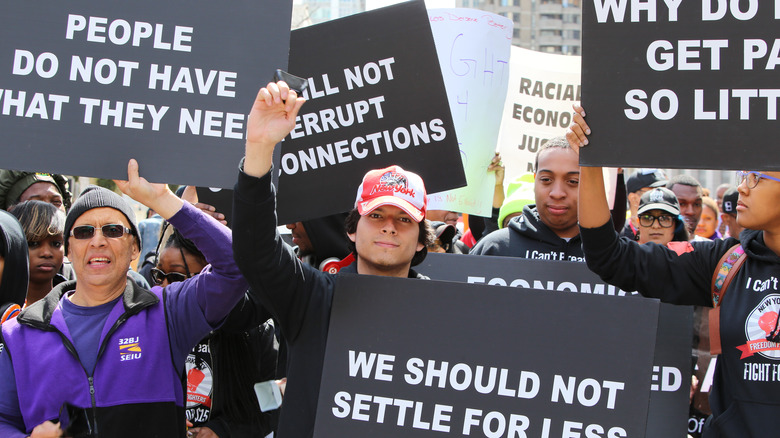Restaurant Workers Have Been Unknowingly Paying Lobbyists To Keep Their Wages Low
Requiring restaurant workers to take a food safety course before they start handling any products seems like a no-brainer. Chefs, waiters, and bartenders should know the basics of handling food and when it's unsafe to serve, right? But according to a report by The New York Times, one lobbying group took advantage of this logic to make restaurant workers pay for the lobbying that kept their wages stagnant.
The New York Times claims that the National Restaurant Association has raised millions of dollars over the years through ownership of the company ServSafe. This company is known within the industry as the de facto training option for food handling safety courses. These kinds of courses are required by law in Texas, California, Illinois, and Florida and are commonly used across the country to train new staff. Many have to retake the courses every three years as well. The class is $15, and the cost is usually passed onto the employees themselves.
The New York Times found that the annual revenue generated by these courses since 2010 totaled more than $25 million and easily covered the company's lobbying costs in that same period. Grub Street adds that even though ServSafe is well known within the industry, even experienced restaurateurs had no idea the company was linked to the National Restaurant Association.
Minimum wage has been stagnant for 15 years
The New York Times says that the National Restaurant Association is the largest food-service lobbying firm in the country; the outlet reports that the organization "has spent decades fighting increases to the minimum wage at the federal and state levels." It acquired ServSafe after a loss in that fight back in 2009 when the minimum wage was last raised to $7.25.
The National Restaurant Association was seeking a way to raise its income without increasing its dues, so it acquired the profitable education company ServSafe. It then used its lobbying skills to mandate this training for all restaurant workers — instead of just managers, as was previously the case — in California, Texas, and Illinois. This effectively secured a large income without having to raise dues. The New York Times adds that this practice is not considered illegal.
The fight for a higher minimum wage has been a hot topic for the last decade. The official Fight for $15 movement began in 2012, but other advocates at both state and federal levels have taken up the cause as well. In that time, Washington D.C. has approved a $15 minimum, and California has even approved a raise to $22, but the federal minimum has been stagnant in that time. This report by The New York Times shows that the people who are most affected by this pause in wage increases are also apparently the people who are paying to lobby against those changes.

